In keeping with summer, the high season for newcomers to windsurfing, we go back to basics this month and look at the fundamentals of rig tuning. Getting your rig to its optimal state is all about finding a base to work from and then tune, experiment and reflect from there. This piece is not going to disappear off in a haze of luff curve, flex response time and other fancy jargon, but rather provide you with the basics that I have seen benefit hundreds of people I have coached. The main areas we will cover are: harness line length, spread and position, boom height and the main trimming variables of both outhaul and downhaul.

When I am coaching, I love to ask my people questions, engage them and help them become better at self coaching, so they can continue to ask themselves questions and the progression continues. One of my favourite questions is what are the names of the 3 corners and 3 sides of the sail?
For corners, the bottom corner is called the tack, the top corner is called the head and the back corner (where you look mid gybe) is called the clew.
For sides, the bottom side is called the foot. A freeride sail has a low foot to help keep power down low for blasting, whilst a wave sail will have a higher foot for manoeuvrability. The leading edge of a sail is called the luff, with the mast going in the ‘luff tube’. To luff can also mean head upwind or sheet out. Opposite the luff, is the trailing edge, known as the leech.
“ TUNE, EXPERIMENT AND REFLECT.”
HARNESS LINE LENGTH
This subject can be very contentious, but I advocate long lines so the sail can work with you and you are in a position that is fluid and in balance with the sail’s power. A greater distance from the rig in a straight line means you are more likely to maintain this in a move and so have a higher likelihood of completion. Longer lines also facilitate easy hooking in and out, which will smooth out your transition entrances and exits. Longer lines also get the rig more upright and therefore more efficient. The best way to embrace long lines is to sail one handed, as you have long heard me champion. Please note it is not too long a line that causes you to unhook, it is raising our hips and bending our arms in, a common ill in windsurfing.
Bu hikaye Windsurf dergisinin Issue 388 - August 2019 sayısından alınmıştır.
Start your 7-day Magzter GOLD free trial to access thousands of curated premium stories, and 9,000+ magazines and newspapers.
Already a subscriber ? Giriş Yap
Bu hikaye Windsurf dergisinin Issue 388 - August 2019 sayısından alınmıştır.
Start your 7-day Magzter GOLD free trial to access thousands of curated premium stories, and 9,000+ magazines and newspapers.
Already a subscriber? Giriş Yap
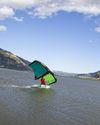
New School
Slingshot’s windsurfing brand manager, Wyatt Miller, has noticed that kids are drawn to playing with wings and puts forward an interesting case as to why he thinks this could help entice them and others into windsurfing.
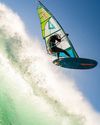
Changes
Wave sailor Flo Jung reflects on our changed world during his lockdown in Germany.
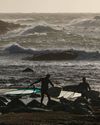
THE LAST WAVE
Lockdown stirred the creative juices of reader Björn Alfthan, who peers into the future to present a fictional story set in the wild waves of Norway, five years from now.
STILL IN THE GAME
After a horrific fracture in his leg from a crashed aerial in 2018, Alessio Stillrich is back! John Carter talks to the highflyer from Gran Canaria about his move to the Simmer team, recovering from injury and how he learned to windsurf in Gran Canaria!
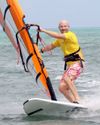
MOVE ON UP - GET ON THE FRONT FOOT
This month we look at how our front foot weighting can affect and improve different aspects of our main windsurfing moves.
SOUTH' KIPA
Nik tweaking it over home waters.
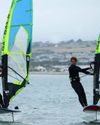
A NEW NORMAL
On a trip to La Tranche-sur-Mer in France last year, Tris Best estimated over 80% of the windsurfers were foiling. This summer in Portland Harbour, foiling activity has increased dramatically too he reports. With the market offering plenty of choice to recreational windfoilers, our test team check out some of the latest foil offerings.
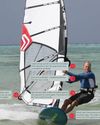
TACKING – THE SEQUEL
Having given you time to practice, Harty concludes his tacking series by critiquing various tacking options, including the carve tack, as well as offering solutions to common slip-ups.

‘NO VAPOUR TRAILS TO SCAR THE SKY' *
Realising we may be about to enter an extraordinary period in our lives, Harty decided to keep a windsurf-centric lockdown diary. Here are some of his choice excerpts.
REDEMPTION DAY!
Renowned for its windsurfing and variety of spots to sail at, Kimmerdige Bay is a wave sailing jewel on the south coast of England. Timo Mullen gives a guide to its shores while reflecting on why a recent session there was a reminder that there is no place like home!